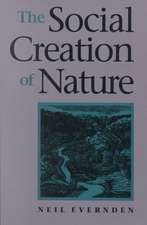Ecological Modeling: An Introduction to the Art and Science of Modeling Ecological Systems: Developments in Environmental Modelling, cartea 31
Autor Hsiao-Hsuan Wang, William E. Granten Limba Engleză Paperback – 14 aug 2019
- Provides readers with a commonsense understanding of the systems perspective and its foundations in general system theory
- Highlights the importance of a solid understanding of the qualitative aspects of the modeling process
- Facilitates the ability to appropriately evaluate and use ecological models
- Supports learning with a variety of simple examples to instill the desire and confidence to embark upon the modeling experience
Preț: 747.31 lei
Preț vechi: 1023.71 lei
-27% Nou
Puncte Express: 1121
Preț estimativ în valută:
143.02€ • 148.76$ • 118.07£
143.02€ • 148.76$ • 118.07£
Carte tipărită la comandă
Livrare economică 14-28 aprilie
Preluare comenzi: 021 569.72.76
Specificații
ISBN-13: 9780444641632
ISBN-10: 0444641637
Pagini: 302
Dimensiuni: 191 x 235 x 20 mm
Greutate: 0.53 kg
Editura: ELSEVIER SCIENCE
Seria Developments in Environmental Modelling
ISBN-10: 0444641637
Pagini: 302
Dimensiuni: 191 x 235 x 20 mm
Greutate: 0.53 kg
Editura: ELSEVIER SCIENCE
Seria Developments in Environmental Modelling
Public țintă
Primer and reference book for natural resource and environmental professionals at both managerial and policy levels whose jobs involve the development, evaluation, and/or use of ecological models. Examples include professionals in programs dealing with wildlife and fisheries management, forestry, and environmental quality, as well as those focusing on more specific areas such as pest control and the management of endangered species, invasive species, and emerging diseases.Also graduate-level and upper-division undergraduate-level students on courses covering topics related to the use of systems analysis and simulation in ecology, natural resource management, and the environment.
Cuprins
Part 1: The Systems Perspective
1. Systems, models, and modeling
2. Basic building blocks of system structure and behavior
Part 2: The Modeling Process
3. Overview of procedures
4. Conceptual model formulation
5. Quantitative model specification
6. Model evaluation
7. Model application
Part 3: Some Practical Considerations
8. Potential pitfalls during the modeling process
9. A candid view of the modeling process
Part 4: Reflections
10. How good ("valid") are models?
11. What good is modeling?
12. Embracing uncertainty
13. Integration of existing models
14. Alternative ecological modeling formats: Commonalities from a systems perspective
15. What about the art of modeling?
1. Systems, models, and modeling
2. Basic building blocks of system structure and behavior
Part 2: The Modeling Process
3. Overview of procedures
4. Conceptual model formulation
5. Quantitative model specification
6. Model evaluation
7. Model application
Part 3: Some Practical Considerations
8. Potential pitfalls during the modeling process
9. A candid view of the modeling process
Part 4: Reflections
10. How good ("valid") are models?
11. What good is modeling?
12. Embracing uncertainty
13. Integration of existing models
14. Alternative ecological modeling formats: Commonalities from a systems perspective
15. What about the art of modeling?


























